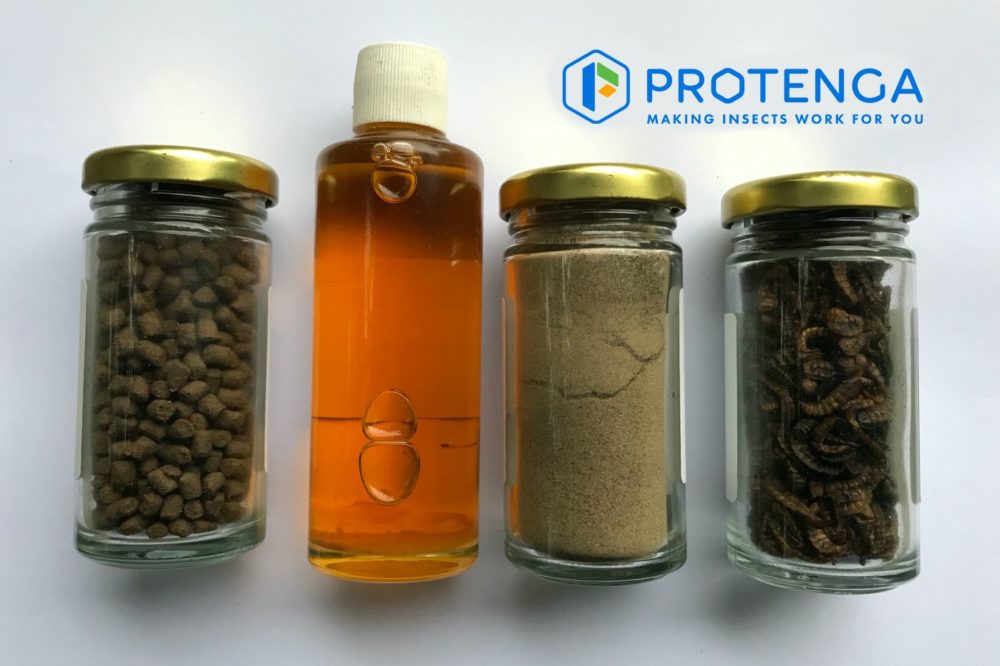UK agritech venture builder Roslin Technologies and Enterprise Singapore’s SEEDS Capital, an investment vehicle linked with the city-state’s government, have pumped $1.6 million into insect farming startup Protenga.
Roslin Technologies is affiliated with the University of Edinburgh’s Roslin Institute, famous for breeding Dolly the Sheep – the world’s first cloned mammal. Part of the Protenga deal will see a bespoke genetic nucleus facility built near Roslin’s Edinburgh headquarters, which will focus on applying enhanced breeding technologies to develop improved insect lines together with the startup for the global market.
As many other insect startups have done, Protenga – which is headquartered in Singapore with a production facility in Malaysia — has identified a species blessed with an eye-catching name and endowed with powerful natural abilities: the Black Soldier Fly. Breeding this species, the team believe, can be a way to provide sustainable protein sources to livestock, aquaculture stock, and pets. Protenga’s production line also generates organic material for fertilizer through a process similar to composting.
This “zero-waste” approach helps to solve the issue of insect frass — that is, the waste produced by the farmed insects themselves — by transforming excreta into bio-fertilizer.
The startup will use the funding to boost production and carry out further research and development around genetics. Some of the capital will also go towards expansion of its ‘Smart Insect Farm’ offering — a decentralized model that turns agricultural and food waste into useful products — across Asia Pacific.
Protenga’s solutions for Black Soldier Fly production and waste bioconversion “enables the company to have a differentiated and scalable business model in the insect protein space, and addresses the growing gap in the demand and supply of animal feed,” said SEEDS Capital general manager Geoffrey Yeo.
“The investment in Protenga builds on our existing focus in agrifood technologies and further develops the alternative protein ecosystem in Singapore.”
Lords of the Black Soldier Flies
As AFN reported in an overview of Black Soldier Fly farming earlier this month, there are a number of approaches that companies like Protenga can follow as insect farming diversifies.
One key strategic decision is whether to go for the distributed model of mini-farms like those at the UK’s Better Origin, or focus on emulating some of the more centralized ideas of other ento-preneurs.
NextProtein, a French-Tunisian startup, recently raised €10.2 million ($11.2 million) in Series A funding on the premise of designing and building a main facility in Tunisia. More mature insect startups like Enterra, AgriProtein, and Entocycle have similarly centralized models.
Offering a mid-sized option — too big to be mini, too small to be centralized — are companies like Bulgaria’s Nasekomo, which recently raised $4.5 million to deploy its robotized insect-rearing technology and is already selling “ecological pet food” in European markets. Venture firms Morningside Hill and New Vision 3, backed by the EU Fund of Funds in Bulgaria, participated in the round.
Speaking at the time, Nasekomo co-founder Marc Bolard told AFN about his firm’s designs for a specialized insect-rearing robot informed by computer vision. Rather than using trays in stacks, the startup has conceived a novel “rearing bed.” He also pointed out how Black Soldier Fly byproducts could be a useful fertilizer for local farms.
Other startups are considering leaving the production and breeding to others, to instead focus on the extraction of valuable chemicals from insects. Singaporean entrepreneur Chua Kai-Ning co-founded a startup back in 2017 called Insectta, which set out as a farm for animal feeds but recently pivoted to the extraction of Black Soldier Fly biomaterials.
There are debates in the entomological community about how the flies themselves can be even more useful. At a conference just before lockdown hit London, BetaBugs CEO Thomas Farrugia explained how the Black Soldier Fly could be bred to be even more voracious, and to grow even faster; their short life cycles made them ideal candidates for observing the effects — or side effects — of gene editing.
Regulations on gene editing of insects may end up being lighter than for larger livestock, he suggested, and so the upside could be faster synthetic evolution.
Moreover, Black Soldier Flies are not the only insects on the menu. Production of mealworms — the larval stage of the Mealworm Beetle — is a popular choice for insect startups, especially after Ynsect’s robotized mealworm farming tech broke records with its $125 million Series C round last year. Other insect choices for startups include bees, crickets, grasshoppers, and locusts.
Additional reporting by Jack Ellis. You can reach us at [email protected] and [email protected]





